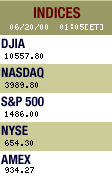| Corporate Financial Healthcare Technology | |
| Stock of the Day Tip of the Day Periscope | |
 for more information | |
|
Citigroup Poised for Record Samurai Issue
The record is currently held by International Business
Machines Corp, which offered 140 billion yen in two-year Samurai
bonds in June.
Citigroup filed a securities registration statement with
Japan's Ministry of Finance (MOF) recently. Citigroup's Samurai
will be lead managed by Nikko Salomon Smith Barney.
"The current proposed Samurai offering will build on our
recent successful global yen offering,'' Firoz Tarapore, deputy
treasurer of Citigroup, said in a statement.
"Like Citigroup's growing business enterprises in Japan, these
new fundings are strategic in nature and will help expand our
institutional and retail investor franchises in Japan.''
A new accounting rule in the United States, which requires
U.S. firms to mark-to-market foreign currency swap transactions,
may be encouraging yen bond issuance by those that need to borrow
funds directly in yen, underwriters said.
ISSUES LOOM
Merrill Lynch has also filed a registration statement with the
ministry and is planning to issue two tranches of Samurai bonds in
two-year and three-year bonds. The payment date for both bonds is
set for August 29 and they will be lead managed by Merrill Lynch
Japan Inc.
A registration by Morgan Stanley Dean Witter last week
indicated it is also planning to issue 50 billion yen worth of
five-year Samurai bonds later in the month.
Other U.S. financial institutions such as Goldman Sachs and
Lehman Brothers issued Samurai bonds in July and J.P.
Issuance of Samurai bonds has been on the rise this year as
cash-rich Japanese investors seek high returns in an ultra-low
interest rate environment, while foreign firms are eager to tap
the yen bond market to raise low-cost funds.
The BOJ's long-awaited tightening on Friday is not expected to
stem the flow of Samurai issues, mostly because Japanese interest
rates are still not expected to rise repeatedly while the
country's economic outlook remains uncertain.
Demand by Japanese investors is expected to remain strong for
Samurais given their generally higher returns compared to domestic
government or corporate bonds, the underwriters said.
| ||
|
© , Fox Market Wire. All Rights Reserved Sitemap | Terms |